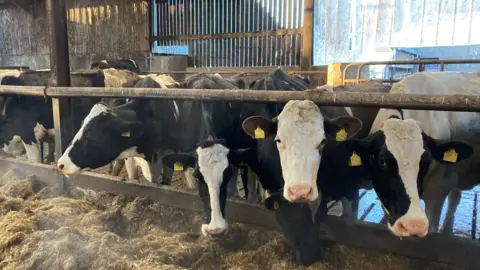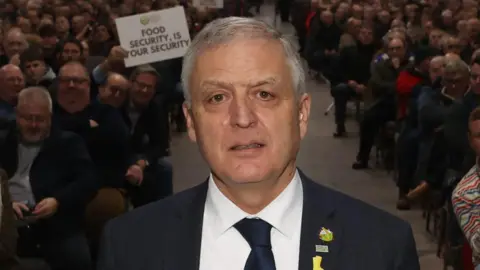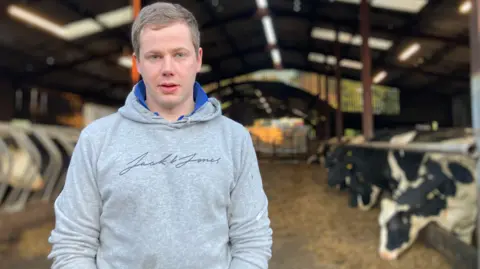Review of bovine TB approach 'an insult', says farmers' union
 BBC
BBCThe latest review of Northern Ireland’s approach to tackling bovine TB is “an insult”, a leading farmers' union has said.
The review by the chief veterinary officer, which was commissioned by the Department of Agriculture, Environment and Rural Affairs (Daera), found that a “fundamental change” in the approach is needed.
Earlier, Brian Dooher told Stormont's agriculture and environment committee that he proposed a year-long trap, vaccinate and release (TVR) programme, followed by a specific, targeted cull based on the data gathered in that time.
He also said regionalisation would be important to target any interventions adopted by the Minister Andrew Muir.
However, the Ulster Farmers’ Union (UFU) said the review contained “no meaningful action” to address the bovine TB “crisis” in Northern Ireland.
About 10% of herds in Northern Ireland are affected by the disease, which cost the public purse £55.7m in 2023/24.
Almost two-thirds of that total, £36.5m, was paid in compensation to farmers for the removal of animals.
The cumulative cost of the bovine TB programme in the last 20 years is about £750m.
'Missed opportunity'
William Irvine, president of the UFU, said that often "too many" cattle and livestock are removed due to bovine TB.
This has both an emotional and financial impact on farmers, he added.
"We’re sad today to be honest because we thought we were on a point of a new approach to this disease," he told BBC Radio Ulster's Evening Extra programme.
 Pacemaker
PacemakerHe described the review's findings as a "massive missed opportunity" to make meaningful action to address the bovine TB "crisis".
An earlier statement from the UFU said farmers do not have "any faith left" in Daera to address the issue of bovine TB, and accused the department of failing farmers.
"Farmers cannot afford any more delays, their resilience has been battered and bruised by TB," the statement said.
"We need clear, decisive action now."
The UFU said the disease is "out of control" and the proposals are "anything that suitable".
The union also called for a meeting with the first and deputy first ministers to address the community's ongoing concerns with the disease.
"This is not just an issue for the farming sector, it is a matter of national importance," it added.
Status quo 'not an option'
Earlier, the chief veterinary officer presented his review's findings of controlling bovine TB in Northern Ireland to a Stormont committee.
He proposed a three-strand approach of measures themed around people, cattle and wildlife.
Mr Dooher said "one size does not fit all" and a "fundamental change" was required.
He added that bovine TB needed "to be made visible again as the infectious, zoonotic, potentially fatal disease that it is with clear economic impacts".
But his review is not a final decision on the way forward.
The chief veterinary officer warned that, given the current trajectory, spend on the programme alone may be expected to exceed £1bn over the next 15 years.
Mr Muir told the committee that it was his hope the report marked a “turning point”, saying “the status quo is not an option”.
In October 2023, a court rescinded an order by the former minister Edwin Poots for a wildlife cull of badgers.
Dr Peter McEvoy, director of land management at charity Ulster Wildlife, called the latest review "very sound".
"The fact there are good facts and figures in this report [indicates that] we can hopefully sit down and talk and come out with a proportionate intervention that is appropriate," he told Evening Extra.
He said that he acknowledges that wildlife can be a "reservoir" for the disease, but that studies have found cattle-to-cattle transmission of bovine TB is more common than badger-to-cattle transmission.
"Our position is that killing healthy badgers is not acceptable or proportionate," he explained.
"We have said that there is a way forward for wildlife which is vaccination and TVR in limited circumstances."
'A mountain pulling us down'

Ross Beattie's family dairy farm, situated between Ballymoney and Kilrea, has been badly affected by bovine TB since 2020.
“We’re been shut, closed down in the herd since Covid came in 2020.
“We’re majorly overstocked. This has put a lot of added workload on to us.
“We’ve lost over 200 cattle in that period of time. These cattle have had to go and we’ve lost generations of breeding out of our cattle.”
Mr Beattie said less than 15% of those cattle had TB lesions.
“We only milk 120 here on the farm. We’re struggling to keep numbers going for it. We’re struggling as a business and we can’t see any way out of this.
“This has a huge financial strain on our business. We are a dairy farm primarily. We sell milk to the public and now, with reducing the number of cows on our farm after losing so many, we cannot keep the milk pool available that should be there.
“We’re now financially at half the value of the milk going that we had pre-2020 because our cow numbers are so low."
Generations of breeding 'disappear'
He added that "breeding had been wiped out" on his farm.
"My father-in-law has had 40 years between him and his father before that breeding cattle up and that has been completely destroyed.
“Emotionally this has been a disaster. My father-in-law couldn’t actually stand beside me today to tell you the story because he has just been in stress over the head of this. He feels himself getting lower.
“He sees good quality stock that we do try to keep, he has seen generations of breeding disappear overnight with continuous testing.
“Mentally it’s quite soul-destroying. You see young cows going, having to leave the farm. There should be no reason for why that is. TB is causing us huge stress. We just can't function as a business."
He added that a number of farms in the area were affected.
"We’re a TB area hotpot and it has to boil down to wildlife within this area. There’s no nose-to-nose contact within our herd with any other herd. We do our bit for the environment… but I just keep feeling like this TB mountain is pulling us down."
Mr Beattie believes “a wildlife intervention within certain areas” is the only way to move forward.
